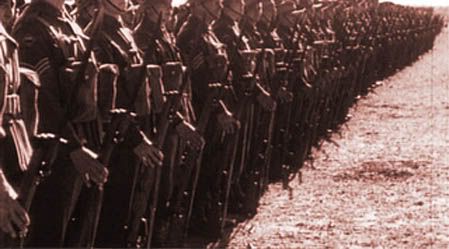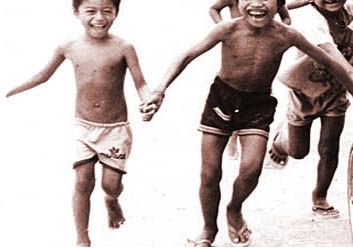This was not a scene in Fight Club, and I wasn’t Tyler Durden. This was summer of 1987, and I was speaking to a bunch of kids younger than myself. It was already months after I saw Oliver Stone’s Platoon, and I couldn’t still get over the idea of people following orders. It was fascinating. It fascinated me that adults with supposed wisdom in their heads could obey somebody’s stupidest command to the death. So this afternoon, in our front yard, I gathered all my neighbors’ kids—the youngest five, the oldest probably eight—to “consummate” my newly found enthusiasm.
“And our mission,” I said, as I stared at their faces one by one, trying to simulate as much Willem Dafoe military gravitas as possible, “is we’re going to hunt.”
“What are we going to hunt, sir?” one of them asked.
“We’re going to hunt… Hmmmm…” I stopped for a moment; I was mentally choosing between hunting small animals and harassing much younger kids that we could always find playing with paper dolls somewhere. It was a windy afternoon, and the undulating rice stalks in the fields just beyond our picket fence added up to my excitement. These kids were putty in my hands.
“We’re going to hunt snails.”
[The golden apple snail]
There was no greater fun than “hunting” golden snails. Even in the present, the Philippines’ rice fields are still crawling with them; they’re one of those botched agricultural projects that remind you of a doomsday movie, or the creation of chlorofluorocarbons, or Adolf Hitler—things that seemed a solution at first, but later wreaked more havoc than a blonde bitch could do in a room full of horny men. I think the snails were supposedly imported to augment the local food supply, but instead they turned out to be such pests, like today’s janitor fishes. They devour rice seedlings that in some estimates, farmers lose up to 40% of their crops to the snails.
In the 1980s, when my family still lived just a leap away from some hectares of rice paddies, the snails were good “toys”; whenever I was bored and when mother wasn’t looking, I’d take off my rubber slippers and wade through the mud to collect them. Then I’d dump a pail of these snails in our yard and I’d sit back and watch how they’d try to escape from me, their “monster.” Then as coup de grace, I’d stomp on them like what Godzilla did with the citizens of Tokyo. Crushed, the snails were a “hot snack” for free-ranging chickens and ducks that roamed the neighborhood. So it’s probably fair to say that on any given afternoon in those days, everybody, except the farmers, was happy with the snails.
When my platoon came back, each of them had a handful of snails. Their loyalty and efficiency made me smile. I ran to our grocery store, took a small bottle of cooking oil and some empty tin cans and candles, then I told them to follow me to the back yard.
“In single file,” I barked. “And don’t forget to march.”
They giggled and marched behind me.
“This is survival training,” I was saying as I lit the candles and poured some cooking oil into each of the cans. “We’re lost in the jungle, boys. And we have nothing to eat. Thank Jesus Christ we have these snails.”
The “brilliant mission” was elegantly simple: Fry the snails in tin cans, using candles as our stoves.
“At my signal,” I said, “when the oil is hot enough, drop your favorite snail into your can.”
They were all grinning as they held the cans over their candles. When the oil began to smoke, I gave the signal to “unleash hell.” The snails smelled like a revolting combination of black mud and fish, but I stifled my disgust and said, “Yummy!”
The kids chimed, “Yummy!”
And through it all, I never forgot pretending I was Willem Dafoe.
Then when the snails looked dead and fried enough, I ordered them to scoop up the snails and place them on the “ceremonial leaf.”
“What’s a ceremonial leaf, sir?”
“Any broad leaf is a ceremonial leaf,” I snapped.
“Why do we need a ceremonial leaf, sir?”
“Because the platoon will use no ordinary dining plates. Because the platoon will always use Nature as its tool. Understand?”
They looked around, saw a harmless-looking alugbati vine crawling on the fence, and attacked it. In an instant, the vine was as bald as Bembol Roco.
After everybody (except me, of course) had a snail-on-a-leaf “survival meal,” I simply told them to eat it. They all hesitated. One of them asked “Why aren’t you eating a snail, sir?”
I glared at the upstart. “Of course, not. I’m the captain. Captains don’t eat the snails of the platoon.”
They said nothing. So I said, I’m opening a bottle of Coke as soon as they’ve eaten the “survival meal.”
What followed was something that reminded you of a bukkake session: suddenly, upon hearing the “reward,” they were outdoing one another in trying to make a disgusting thing look delectable. But the moment they finished the snails, my mother called out and I promptly forgot about the promised Coke.
That night, I heard a commotion outside our grocery store. I peered through our window’s slats and saw my platoon’s mothers, all cackling like a flock of geese about their kids’ inexplicable gut-rot. I felt that they already knew it; I was sure all the kids had already ratted on their “beloved captain.” But because we owned the only well-stocked store in the neighborhood, on which the housewives depended so much whenever making ends meet was as difficult as diarrhea, nobody had the nerve to say to my mother’s face everybody’s suspicion.
I was frightened; I ran to my room, glared at the mirror, and told my reflection, “If they all die, you’re dead, too.”
I didn’t dare venturing out of our house that weekend. I didn’t want my platoon or their mothers meeting me on the road and finding my face so full of guilt. I was busy, anyway—I had recently discovered my father’s stash of porn, and I was consumed with the suspicion that our house harbored unimagined treasures I had yet to discover. So I was digging up dusty corners and suspicious-looking boxes in my feverish search for more skin.
One afternoon in the week that followed, I found the kids again playing with toy cars in the dirt. They wouldn’t even look at me. When it dawned on me that I had become some sort of pariah, I ran back to the house, sneaked into the store, and took a handful of colorful hard candies.
I ran out and declared: “Who wants candies?”
All faces turned to me, but everyone stood their ground.
“Alright, you can have these. But we have a new mission, boys. Those who want to join me, raise their hands.”
Everybody raised hands.
I stared at them all, my eyes gleaming in sinister delight.
It was the first time I discovered a shining truth: People never learn. You could always slaughter more innocents.
***
For similar posts, see Backtracks and Fast-forwards.
Tags:




1 comment:
Sadistic.
Post a Comment